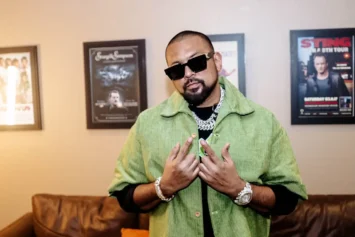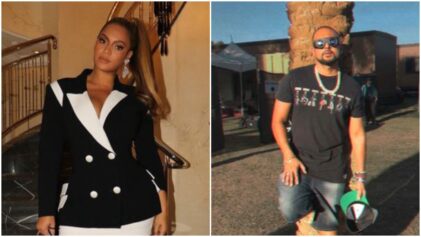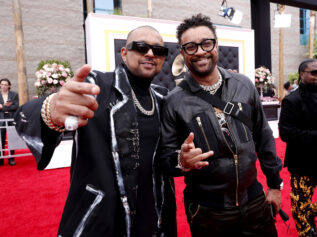Dancehall icon Sean Paul is emerging from the pandemic feeling rejuvenated and ready to work, as evidenced by the multiple projects he has underway, including a track with fellow artists Shaggy and Spice and two albums, and those are only his plans for 2021.
Paul spoke with Atlanta Black Star about the “simple” decision to work with Spice and Shaggy on their single “Do Down Deh,” the barriers that he feels are keeping more reggae and dancehall artists from successfully crossing over into the American music industry, what fans can look forward to from him next, and reflected on which of his classics record executives were on the fence about in the beginning.

When Jamaican star Spice and Reggae legend Shaggy called up the “Temperature” singer to ask him to add his distinctive vocals to “Go Down Deh” the answer was a “no-brainer.” He and Shaggy go way back, and both were fans of Spice, so it was an easy yes in his book.
“Me and Shaggy are friends, and we’re both fans … of Spice and have wanted her to get to an album for years now. … And so when me and Shaggy decided to … Shaggy called me and said, ‘Yo, I have a tune with Spice.’ And then she sent me a message basically same day saying, ‘Yo, I need you on this thing.’ And I immediately heard the ‘doom, doom, doom, doom,’ the music, and I was like, ‘Yo, this rhythm is crazy.’ And the song, crazy. So it was a no-brainer for me. I hit back the track in 24 hours. They was like, ‘Whoa.’ And good vibes all the way.”
Within the first week of its release, the single reached No. 1 on the U.S. Reggae iTunes chart and No. 2 in Canada and the United Kingdom. The trio have been hitting all of the major US circuits, with recent performances and appearances on “The Wendy Williams Show,” “Good Morning America,” and “Jimmy Kimmel Live!”
As happy as he is to see Spice begin to cross over into American fame beyond “Love and Hip-Hop: Atlanta,” the hitmaker feels that there are still very clear obstacles that exist between American and Jamaican cultures that make it more difficult for reggae, dancehall, and even reggaeton artists to find success in the U.S.
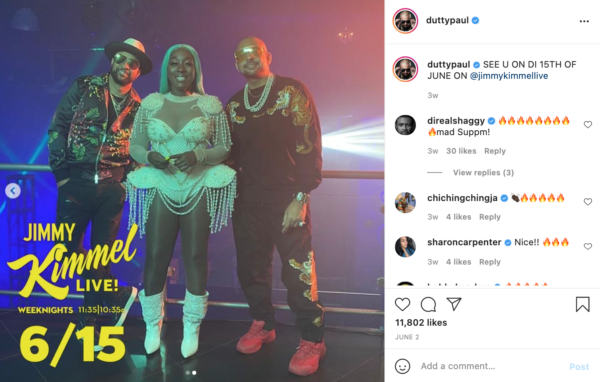
“We speak English here, but it’s a broken English,” he said of Jamaican patois, attributing one of the obstacles to the language barrier that exists between the two cultures. “It’s mixed with different African dialects, and it changes every day. And this is what we put in our music. So, it’s very unique. It’s very expressive. It’s very creative, but also there’s a big barrier where a lot of people, they don’t understand the language. Or even if they do come to Jamaica and spend even a year here, by the time they went away and came back, the talk has changed. … And people would get confused. You can’t write it in a textbook. So that’s the main, big barrier for us. And it’s not something that I’m saying is a bad thing. It’s a unique thing.”
The second reason that he feels crossing over is so rare falls more within the control of the individual artists, specifically their attitudes, a sentiment echoing the professionalism critiques that Shaggy previously discussed with ABS.
“Other reasons would be, the attitude of our artists at times has been disappointing when they represent us, in terms of just the behaviors that we have,” Paul shared. “I’m one of the persons who saw that from early out and tried to … get people to understand my personality without just being overbearing. A lot of dancehall is very bravado and very … What can I say? Just over the top with certain attitudes. Very macho. And so it kind of rubs people the wrong way at times. And I’ve been one of those who try to, what can I say, to curve that mentality then.” Because I do have it too.”
“Those are the reasons why it’s hard to break in the States. It’s hard for us to make a great mark or be sometimes more than just a one-hit wonder, you know what I mean?” he continued. “There’s many artists from Jamaica who has come through and had a big, huge song, but then no follow-up. And it had to do with, again, the language barrier and just the personality-type thing. For me. That’s in my view of my estimation.”
Paul doesn’t feel the U.S. is without blame for contributing to dancehall and reggae’s crossover obstacles, however, and he pointed out that in his opinion certain types of music fall a little too much outside of what American music lovers are familiar with.
“I also think that the States is, for the most part, a society that doesn’t really look outside of itself a lot,” he said. “You know what I mean? So they’re culturally a bit cut short from the rest of the world sometimes. And so, when there’s something too foreign-sounding, or too Afrocentric-sounding, which dancehall is, it might deter people.”
One of Paul’s earliest hits in America, his 2002 single “Gimme the Light,” helped launch him into crossover success, but getting the higher-ups at his then-label, VP Records, onboard with the single’s release was an obstacle he had to overcome.
“It was called, ‘Gimme the Light.’ VP Records was the record company that I was with at the time,” he said. “And I saw them as my steppingstone towards international waters and to do my first albums. And when I first showed them the song, I played it for them, they were like, ‘We don’t know that song.’ And I was like, ‘It’s really kicking off in circles in … Trinidad right now, and in Miami.’”
“So that night I had a performance … showcasing some stuff off the album, and they were just going to leave that as an album track,” he continued. “I don’t think they had it in mind as a single, but I did it that night on the stage and it got a real big crowd reaction. And then they started to scratch their chins and their head and be like, ‘Hmm, let me see if we would shoot a video for that.’ It took us months to shoot the video. It took a lot of convincing, but that was my song that was kind of like that … it was a very instrumental or very … What can I say? A very pivotal moment for my career, that song.”
Nearly 20 years later, Paul is still in the game and after using the 2020 COVID-19 pandemic as time to rest and focus on family, he’s ready to hit the ground running. In fact, he already has, with the release of not one, but two albums this year.
The first, “Live N Livin,” which debuted March 12, showcases his efforts to bridge the gap between more “established” names in the industry and the younger, up-and-coming artists in hopes of discouraging the “crabs in a barrel” mentality that he says exists in Jamaica. “That album was also a very collaborative effort for me. Big up to Buju Banton, Jr. Gong, Chi Ching Ching, people like … Busy Signal. All of these people, more, probably, established names that people might know, Leftside, Suku from Ward 21.”
“But also I worked with the younger cats on the album,” Paul said. “People like Skillibeng, Masicka, Intence, Govana, Squash, Jesse Royal and people like Bugle. And the reason was, especially because of the conversations I’ve had with those people I mentioned earlier, we don’t do enough collabs in the genre. We like to say ‘crab in a barrel’ kind of mentality in Jamaica, and it’s in our music business too. We always pulling each other back in the barrel where we should be trying to help everyone to get out and get noticed. So I tried to use my platform this year, while I had the space and time. It’s something I’ve wanted to do for a while.”
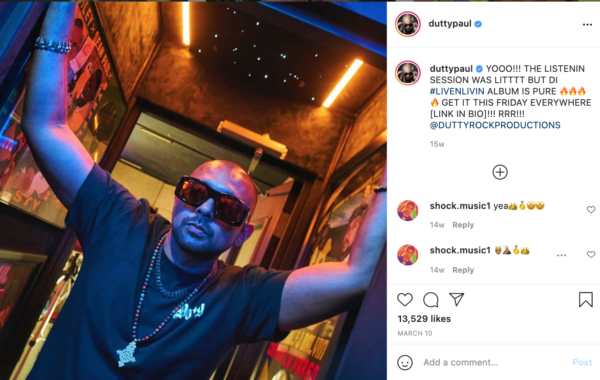
Aiming for a summer release for his second album of the year, “Scorcher,” Paul describes it as “more of an international sound, dancehall vibes.” The project features artists including Ty Dolla $ign, Tove Lo, Gwen Stefani, and Sia.
“This project is more of an international sound, dancehall vibes. I released the first single, called ‘Scorcher,’ quite some time ago, and the album is called ‘Scorcher.’ And so the video just dropped about a month ago or so, and I just shot the second video for the second single, which I’ll be releasing soon. It’s called ‘Only Fans.’ Ty Dolla $ign is on that single. He’s one of the artists that I really respect in the rap culture or the hip-hop game right now.”
While he hopes to leave behind an “awesome” mark on the industry through the music he creates, Paul is remaining focused on the here and now and doesn’t plan on slowing down anytime soon. “I would hope that my legacy remains and that people hear the songs and be like, ‘Oh, this dude was awesome.’ But if it doesn’t happen, I mean, will I be upset in the afterlife? I really don’t know. I know that I’m here now and I need to enjoy this, and full joy, in a greater sense.”
